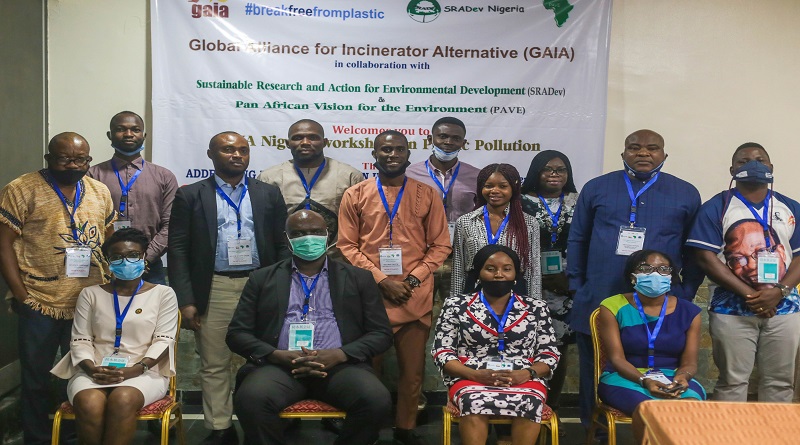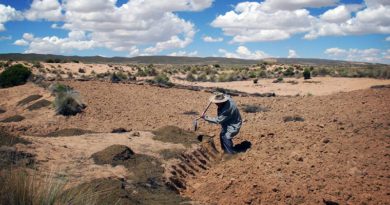GAIA Nigeria wants FG to ban single-use plastic by 2021, adopt National Plastic Policy
Picture Caption: Sitting. ( L-R.) Mrs. Adeola Akinsola of LAWMA, Mr. Adeoye Babajide, Director, Lagos state Ministry of Environment and representative of the Commissioner for the Environment; Mrs. Oguntola J.O and Executive Director FBRA, Agharase Onaghise: Standing are the members of GAIA Nigeria during the opening session of the three-day workshop on addressing plastic pollution in Nigeria from 7-9 October 2020 in Lagos.
Worried by the danger that rising plastic pollution poses to the physical environment and human health, a group of civil society under the aegis of Global Alliance for Incinerator Alternatives (GAIA) Nigeria has called on the Federal Government to ban single-use plastic with effect from year 2021 as against the current 2028 date contained in the proposed National Policy on Plastic Waste Management
Essentially, the group said the single-use plastic ban should start with styofoam, microbeads and carrier bags, as they have no economic value- recycling potential, adding that the proposed National Policy on Plastic Waste Management should be immediately adopted and approved by the Federal Executive Council (FEC) to give way to the promulgation of appropriate regulations on plastic waste management in Nigeria.
In a communiqué at the end of its three-day workshop held in Lagos, last week, co-hosted by Sustainable Research and Action for Environmental Development (SRADev Nigeria) and Pan African Vision for the Environment (PAVE) recommended the need for referenceable disaggregated data on the quantity of plastic products being manufactured, used and imported in the country; urgent need for civil society to fill the identified gaps in the proposed National Policy on plastic waste management before its adoption by the FEC; urgent need for standard operating procedure/guidelines for the plastic recycling/management sector; effectiveness of the management of plastics in Nigeria requires an inclusive approach which should entail the collaboration of different stakeholders at grassroots level including community, religious and political leaders and that the government, civil societies and corporate bodies should take the lead to sensitize the general public on the health implication of plastic waste.
The workshop, tagged “Civil Society’s Perspective to Addressing Plastic Pollution in Nigeria” and attended by GAIA Nigeria member including Centre for Earth Works (CFEW), Green Knowledge Foundation (GKF), Pan African Vision for the Environment (PAVE), Environmental Rights Action (ERA) and Sustainable Research and Action for Environmental Development (SRADev Nigeria) observed that plastic pollution is a global menace throughout its lifecycle, with health and environmental implications which includes cancers, endocrine disruption, diabetes, obesity, developmental issues, reproductive dysfunction, and respiratory diseases among others.
The communiqué endorsed by the group read “Nigeria is ranked 6th highest country producing unmanaged plastic. Several countries including developing ones are making effort to change the narrative through banning, production and importation of single use plastics. Data is not sufficient to quantify the contribution of the big polluters.
“Nigeria has a National Policy on Plastic Waste Management that is yet to be adopted by the Federal Executive Council. The process has been too slow. However, there exist gaps which GAIA Nigeria is looking into. The Extended Producer Responsibility (EPR) policy of NESREA covers the total life cycle of products. However, it remains a voluntary policy framework. It requires a framework of action for collaborative partnerships among all stakeholders.
“The field experience indicates a gap in the current private sector recycling processes especially collection, compared to the magnitude of the menace of plastics pollution. GAIA Nigeria identified various areas of intervention through which the action plan, including policy and regulation, advocacy/engagement, environmental justice and financial resources is being developed”.
Executive Director, SRADev Nigeria, the co-host of the workshop, Dr. Leslie Adogame, said members would draw and action plan on single use plastic menace, added that the workshop would also enable civil society to broker synergy between the government and private sector on the plastic pollution crisis.
In his presentation on ‘Plastic in Nigeria: Implications on Health an Environment’, Executive Director, SRADev Nigeria, Dr. Leslie Adogame, said Nigeria is among the top ten countries producing the largest amount of mismanaged plastic waste. He added that a dozen of African countries have banned single use of plastic.
Deputy Director, Federal Ministry of Environment, Mr. Oladipo J.O, congratulated the civil society group, adding that plastic management is very important to the Nigeria economy. He disclosed that the National Policy on plastic has been transmitted to the Federal Executive Council for approval.
In his goodwill message, Commissioner for Environment and Water Resources, Lagos State, Mr. Tunji Bello, represented Mr. Adeoye Babajide, a Director in the Ministry said plastic is a burning issue not only in Nigeria but across the world. He said the state government is working to address the issue as it affects free flow of water in drainages in the state leading flooding.
He said the current crisis cannot be allowed to linger, adding “we are working on apolicy that will ensure proper management of plastic”.
Erudite scholar and a distinguished Professor of Chemistry, Babajide Alo of University of Lagos, in his good will message expressed delight on the initiative of GAIA Nigeria to address plastic pollution. He described it as a welcome development that will raise awareness about plastic.
He said through the advocacy, the National Policy on plastic waste of the government will see the light of the day.
The massive expansion of plastic began in the second half of 20th century with the discovery that a waste product from the petrochemical industry could use to make PVC. Between 1950 and 2017, a total of 9.2 billion tonnes of plastic were produced.




